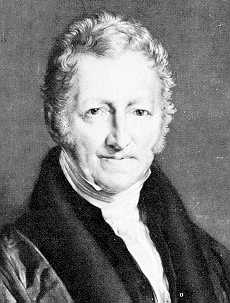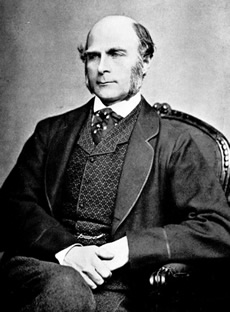Malthus Revisited |
m | |||||||||||
Posted to Subscribers on 14 August 2008 |
||||||||||||
|
|
On my 21st birthday, my father gave me one of those Confucius say cards and a short speech about my duties in life: marriage, two children, preferably one girl and one boy, etc. Since I rarely took anything he said as the last word, it can be no surprise that his words were wasted. Still, for some reason, I remember the scene and the sermon. The social order is maintained by each person acting responsibly, including having enough foresight to consider future generations. Before the advent of various institutionalized health and retirement plans, children were the assurance that the needs of their progenitors would be provided should they survive the vicissitudes of disease, wars, and famines. Since large and sometimes extended families are the foundation of many cultures, efforts to convince people to have fewer children so as to reduce population growth is often met with fierce resistance, sometimes coupled with religious or racial outcries.
Malthus Thomas Robert Malthus is today remembered for his theories on population. His original training was in mathematics. Later, he became a parson, and then, in 1805, he became Britain's first professor of economics. He was employed by the East India Company College, a school operated by the British East India Company for the purpose of training employees for overseas positions. Many of its graduates held very high positions in India, Burma, and other parts of the empire.
It could easily be argued that no one would remember the name Malthus had not his influence been spread by the East India Company. There were six editions of his essay on population, a piece that was at least partly an expression of skepticism over his father's perspectives. His father was a friend of David Hume and Jean-Jacques Rousseau, both of whom were more optimistic about the future of humanity. Malthus the economist believed that population expansion precedes growth of basic necessities such as food so there will always be a class of people in dire straits. It should be emphasized that this was a theory, a personal theory, eventually elevated to status of a natural law, by the first ever economist in Great Britain. The Malthusian Doctrine of Population is taught in every economics department and because of this, we have for two centuries been indoctrinated to believe that abject poverty cannot be eliminated and that food will run out. This is repeated and repeated and repeated and repeated and yet the fact is that the world population has increased somewhat more than six-fold since the publication of An Essay on the Principle of Population — and, if you believe it, it went from Adam and Eve to one billion without the calamities suggested by the Malthusian thesis. Understanding his theories in an historic context is worth a few words. In his book, jobs would not be created fast enough to provide employment to those who are poorest so these miserable specimens of humanity would be forced to accept very low wages. The way the thesis converts to a theory of cyclicality is that investors, seeing that the cost of labor is low, are encouraged to expand and thus to create new jobs — that eventually have better pay and this, in turn, relieves the pressure on the poor. Though this brief summary hardly does justice to the entire Malthusian argument, the concept of an eventual leveling force as well as the concept of lack stuck, and the fact that they stuck means we continue to believe in poverty.
An Alternative View It could as easily be argued that when people are in fear of extinction, they unconsciously, or perhaps sometimes even consciously, do what plants do: they go to seed. We have, as my father suggested, an immense preoccupation with survival, progeny, and therefore procreation. I personally have no doubt that wars and famine often do the opposite of what Malthus proposed. I.e., rather than delaying marriage until gainfully employed, one procreates so that if nabbed by premature death, one's genes will live on in the last seeds spent. This concept does not enjoy the same academic acceptance as the theory of lack, but the fact is that espousers of Malthus are a bit like those in red coats who cry wolf. One cannot be entirely dismissive of Malthus because he saw "ministers of depopulation" wreaking their havoc through wars, pestilence, and famine. Keep in mind that Malthus was originally trained in mathematics. He simply postulated a much swifter growth rate for people than for food. If instead he had assumed that a steady percentage of people farm and more people meant more acres under cultivation, there would never have been a cry of wolf and the theory would have died in obscurity in the basement of a library in a school that was closed. However, he did not postulate something that mundane, he postulated a problem of perpetual poverty. In short, he was a pessimist, but his ideas were embraced by other pessimists and they live on in the hearts and minds of those who share his gloom and doom. There is no question at all that Malthus had a profound influence on economics, but before he espoused his views, the prevailing belief was that more people meant more output, but this really hit the crux of the matter: gross output versus per capita requirements. By emphasizing the per capita quotient, Malthus directed attention to those disenfranchised by the system. He was not "preaching" a political solution. In fact, he advocated charity and generosity towards the poor, but it is impossible to discount his influence because it bled through into Darwinism and concepts of survival that we fervently embrace without respect for the rights of individuals to survive, even if at a subsistence level. In sum, Malthusian theory supports concepts of competition over those of extensive planning to meet future needs by anticipating growth and correct land use. The harshest critics of Malthus have been communist theoreticians who view capitalism as decadent because of its failure to cure privation. Here we must separate the man, Thomas Robert Malthus, from the Malthusian Doctrine. The man did not justify misery; he merely postulated a cause based on exponential growth of population and arithmetic growth of the resources on which people depend. However, the Mathusian doctrines of population spawned many less than humane offspring, such as the concept survival of the fittest and eugenics.
Population Control In the social sciences, there are always fashions of thought, but these thoughts usually emerge from our educational systems and cultural indoctrination. We could argue for or against almost any prevailing or accepted idea based on our own particular perspectives. For instance, if one argues evolution, the human race is becoming more civilized which makes us wonder who built the pyramids of the Egyptian and Mayan Civilizations or the great cathedrals and temples of Spain or India. If you take the view that we are evolving, then we might view space stations as a great advancement over pitiful buildings on the ground. Likewise, we could say that Mozart and Beethoven wrote music that was greater than anything written today or that it will take another few centuries to appreciate "modern music."
Perhaps life is cyclical and golden ages are followed by dark and gloomy ones or involution and evolution occur simultaneously with some people on the descending stream and some on the ascending one. Whatever we believe, it is very clear that certain elitists believe in genetic superiority and based on this, they arrogate to themselves a greater claim to the resources needed for survival. Those with conscience rather than power agendas believe such notions are completely incompatible with humanitarian ideals.
Eugenics The idea of superior traits acquired a formal place in the archives of the history of social philosophy in 1883. Sir Francis Galton, cousin of Darwin, coined the term eugenics, Greek for "good genes." Whether we like it or not, his influence has also been immense.
After publication of his cousin's Origin of the Species, he became obsessed with whether traits are acquired or inherited. He used a method that relied on numbers but was not entirely scientific in that his data was mainly obtained from prominent scientists, such as fellow members of the Royal Society. He was not sloppy and he was certainly assiduous. He explored "nature" versus "nurture" and weighed in on the side of nature, meaning that genes are more important than environment in determining human potential. As we know today, developing a culture-free IQ test is very difficult so Galton was no doubt guilty of perceiving through his own eyes. Nevertheless, it behooves us to see where his thinking led him politically. For instance, Galton advocated financial incentives to the already elite to encourage earlier marriage and more children so as to promote the expansion of preferred genes. He viewed late marriages as dysgenic, meaning they tended to limit the number of offspring of parents with desirable genes. He carried his inquiries very far, into photography and fingerprinting and psychology and criminology and medicine. Ultimately, just before the end of his life, he wrote a novel about an ideal society populated by the fittest and most desirable specimens of humanity. The idea of a super race became very popular and funding was provided by no less than the Rockefellers. Obviously, it pleases the elite no end to have their traits recognized as superior, but it goes without saying that the potential for turning scientific curiosity into political policy is hard to avoid. To give some idea of the range of applications of eugenic theory and philosophy, we need only look at the option to abort fetuses that are determined to be defective or to take the most extreme and abhorrent example: Nazi Germany. However much we have grown used to genetic screening for diseases like Parkinson's, we cannot deny that there would not be a Genome Project had Galton not triggered the imagination with thoughts of Utopias composed of people with "good genes."
Little Emperor Syndrome In 1979, China introduced the one child per family objective, this following a campaign started a few years earlier to reduce the number of children born from an average of five per woman to two. The actual rate is estimated to be 1.8 because exceptions are allowed to the policy and enforcement is not consistent. China estimates that without this policy, the population would be 400 million more than it is today. The original purpose of the policy was to reduce pressure on resources, improve job opportunities, provide better education and health care, and improve the standard of living. The down side is what is called the "little emperor" problem, overindulgence of the only child who, in turn, is later going to be faced with the 4-2-1 syndrome: responsibility for two parents and four grandparents, a large burden compared to previous cultural norms. However, the consensus among Chinese is that the plan is working and it therefore has the support of the populace. Ironically, the population policy was applied to the Han Chinese, not the 55 ethnic minority groups in China. Therefore, relative to the Chinese population, these groups are growing seven times faster than the Han population. Foreign critics allege that the policies are unnecessary because the world can feed 12-14 billion people and stringent population reduction plans are unnecessary.
About 13-14% of the Earth's land is suitable for plowing and food production. The most fertile arable land is near the great rivers of the world, everything from the Ganges to the Tigris and Euphrates to the Mississippi River. Of the land that is not agriculturally useful, the reasons vary from conditions that do not lend themselves to solutions to those that do. For instance, high mountains with year round icy peaks are not likely to produce food but in some places, a few good wells or irrigation ditches or desalinization plants would transform barrenness. In short, if today's population could be supported by proper cultivation of less than 1% of Earth's land, better agricultural practices would easily support considerably more people. Hypothetically, a point could come when Malthusian dread could manifest, but nearly all the problems we face today have to do with poor land use, poor growing practices, inadequate movement and transportation of what is produced, and inefficient consumption habits. Thus, while optimistic sounding, people do also make demands on other resources besides food: consumer goods, construction materials, jobs, and health care. Without sustainable life styles, shortfalls are likely in one or more places where we leave our footprints.
India Prior to the one child per family policy, India and China had comparable fertility levels. However, India's guidelines have been less stringent than China's and there were substantial abuses in the early days of the "two, three, stop" initiative, including many abuses in incentive rewards. More recently, Delhi has rejected "doomsday demographics" and refuses to attribute social problems to population. It is now focusing on advancing the status of women.
Conference on Population In 1994, the United Nations sponsored a population conference. The meeting was held in Cairo. There were 20,000 delegates and the topics covered ranged from family planning to education. The problem was that world population was growing at an "alarming" rate, 1.5-2% a year, meaning that it would double every 40 or so years and, according to the pundits, some people would not find gainful work so they would engage in antisocial activities like war. Obviously, such theories are based on the idea of survival of the fittest and the proclivity of human animals to confront their unrest through violence. In actuality, there are ample cases of people not resisting death via either famine or genocide. Cynics would contend that those who engineer activity on this Planet are counting on this passivity, but, of course, they project otherwise by conjuring up images of terrifying developments.
Useless Eaters The origin of this abhorrent view is not quite known. It is probably not an original idea because the strong often have contempt for the weak, but according to certain scholars, the concept of uselessness has subsumed certain cliques of the industrial world. In Nature, the weak, both young and old, would not be able to survive without protection, but in a world that measures worth only by productivity, those who are unable to stand on their own feet, whether incapacitated by age, deformities, illness, infirmity, or disposition, are "useless" to a society driven by assembly lines of practically nameless and faceless workers, workers who, in the view of their masters, can be replaced by robots. The shabby materialism of the "useless eater" proponents overlooks what truly makes us human, the ability to unfold our creativity and perhaps even our divinity. If the useless eater genre of humans prevailed, we would never have enjoyed the gifts of Helen Keller or Stephen Hawking — people who would be in the cross hairs if the autocrats applied their rules indiscriminately. The reality, however, is that various leaders have thoroughly embraced the concept of useless eaters. Cecil Rhodes, a British racist, would have transformed Africa into a white man's continent . . . had it not been for the Afrikaaners and the Boer War. Shallowly buried racism is very often merely the more repugnant side of competition for resources, the alleged genetic superiority being used to justify crimes against humanity.
Wars and Genocide Based on loose interpretations of Malthusian theories of food supply, powerful individuals and groups have concluded that wars, famine, and disease are essential to the survival of the "fittest". They are thus viewed as "natural" rather than as orchestrated or stemming from extremely poor management. In short, our "human nature" causes us to compete and to do so in such a way that the fittest prevail. It's obviously neither a civilized nor edifying view. The fact is that despite the Black Death and Inquisition, World War I and the "Spanish Flu" that followed, World War II and the Holocaust, and countless regional genocidal conflicts, chemtrails, chlorination and fluoridation of water, genetically modified foods, and so on and so forth, the population of the Planet keeps growing. . . and keeps finding ways both to sustain itself and seek the betterment of the World in which we live. It is time for a new theory of civilization, a new economic model, and responsible trusteeship of the Planet and caring for everyone who lives here.
*Figures on population and land surface area are from World Almanac 1994 [World land surface area is 57.9 million square miles or 37 billion acres; world population is 5.4 billion (p. 828). Dividing 370 million acres (1% of 37 billion) by 1.08 billion (one-fifth of 5.4 billion) yields .34 acres for five people, or 14.6 people per acre. Boston's area is 46 square miles or 29,440 acres; population is 574,283 (p. 663); the same calculations yield 19.5 people per acre]
|
|||||||||||
Home || Contact Us |
||||||||||||
No content on any of the pages of this web site may be reproduced without written permission of Ingrid Naiman and Seventh Ray Press, publisher of this site. |
||||||||||||
|
||||||||||||




